Rebranding Checklist: How to Successfully Rebrand Your Company
- Branding
- Web Design

If you manage a business, then you’re familiar with the phrase “Cash is King”—the notion that liquid funds are the most important asset of a healthy company. But we also live in an attention economy, where people’s time and focus are their own form of currency.
When we’re all vying for visibility, it can be tempting to view rebranding as a quick and easy way to recapture the awareness we’ve lost to our competitors.
Before you start sketching logos and picking Pantone colors, however, it’s vital to ensure you’re not making changes on a whim that will harm your business in the long run.
Once you’ve established that you are in the right position to rebrand, you can use our comprehensive rebranding checklists to make sure you don’t miss any key steps.
How to Determine if a Rebrand is Right for Your Organization
A new identity has plenty of benefits, but only if you’re doing so for the right reasons.
Necessary Reasons to Rebrand
- There has been a significant upheaval to your company’s structure, like an acquisition, merger, or division.
- There have been major changes to your products or service offerings.
- The market or industry has altered drastically in a way that puts your current brand at a disadvantage in comparison to your competition.
- Your company is fighting for digital real estate due to another company with a similar name or identity.
Unnecessary Reasons to Rebrand
- New leadership or management is pushing to rebrand your business.
- Other players in your industry are rebranding.
- Your company wants to generate buzz amongst your target audience.
- Your organization is trying to divert attention from a larger issue like internal turmoil, a public relations crisis, bad positioning, or an outdated product.
Attempting to rebrand during one of these scenarios may hurt your reputation, and many of these issues can be resolved through improved communication, investing in product development, or creating a new targeted campaign.
Types of Rebranding Strategies
After you’ve determined a rebrand is right for your business, the next step is to decide how many aspects of your branding need to change. There are numerous ways to implement a rebrand, from a simple logo tweak to a fresh visual identity and brand standards.
After answering these questions, you can better gauge whether a full or partial rebrand will best suit your goals:
- Does your situation require a new moniker or just a logo?
- Do you need a revised visual identity, or can a new logo work with your existing colors and fonts?
- Are there elements that absolutely must stay, like trademarked messaging or a font you’ve bought the license to?
- Are you and your stakeholders open to starting from scratch?
Full Rebrand
Are you ready to start fresh with a new name, logo, and tone of voice? It may be time for your company to completely reinvent itself and drop any association with its prior identity.
Corporations often go through a full rebrand early in their existence—so early that the majority of their current customer base wouldn’t know their original name. You’ve probably never heard of Blue Ribbon Sports or BackRub, but you’ve surely heard of Nike and Google.
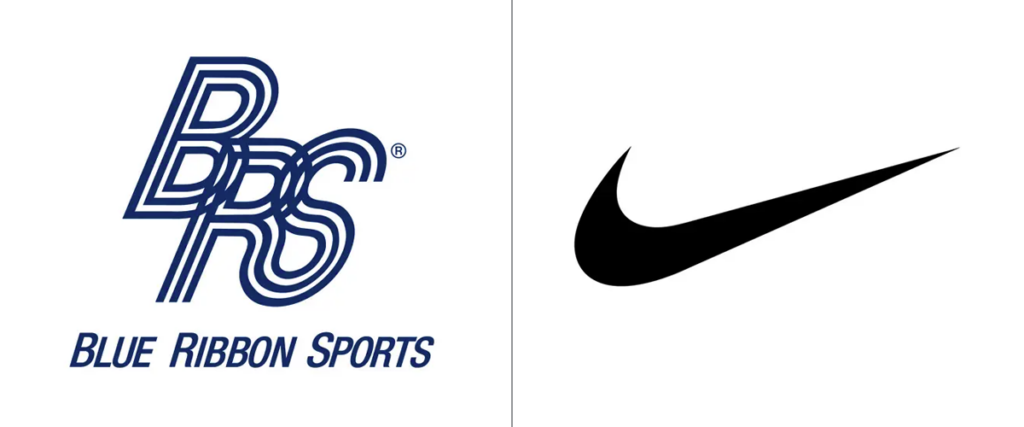
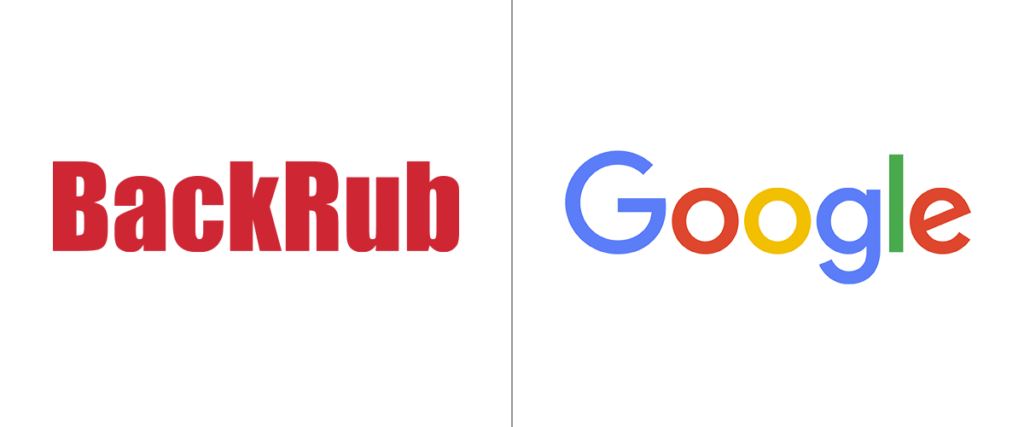
Full rebrands may also be necessary later in an organization’s life when its business objectives change. When ABC Family was no longer a fitting name for the content the cable company was producing, they opted for the more modern name Freeform.
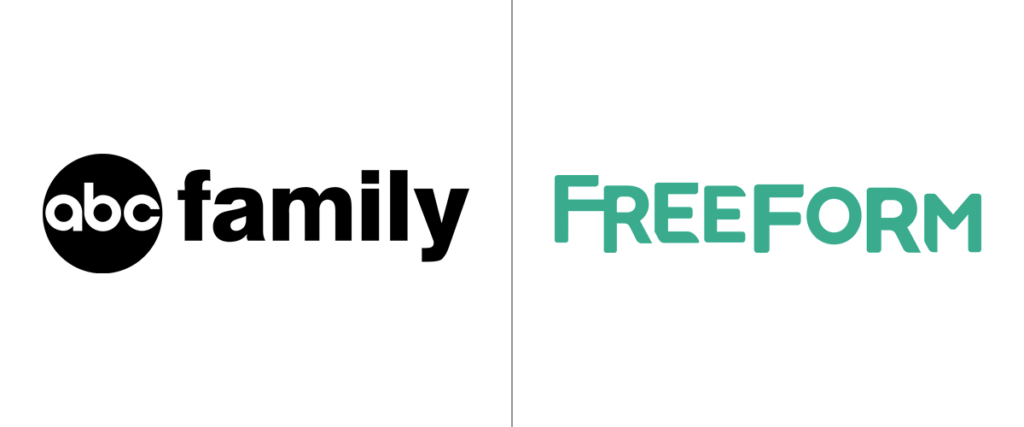
Brand Refresh
A visual refresh is a less intensive way to rebrand and can be done more gradually rather than all at once. It involves updating individual aspects of the brand such as colors, fonts, and/or the logo. It works well when your visual identity still fits the company but feels a bit outdated.
MailChimp had a strong brand refresh in 2018, trading its script wordmark for a chunky lowercase name that more prominently features their mascot, Freddie. They also made a splash by choosing bright yellow as their primary color.
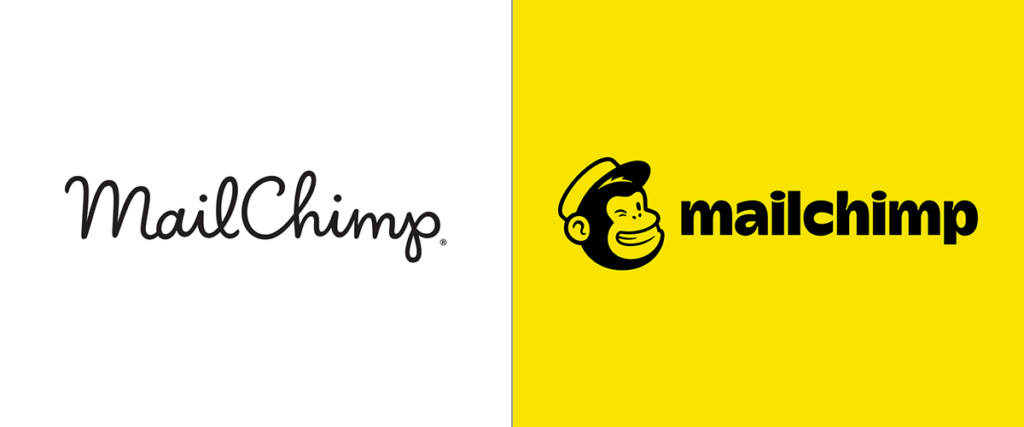
In 2019, Dunkin’ kept its rounded font but dropped half its name and the coffee cup icon. They also opted for a more vibrant orange.
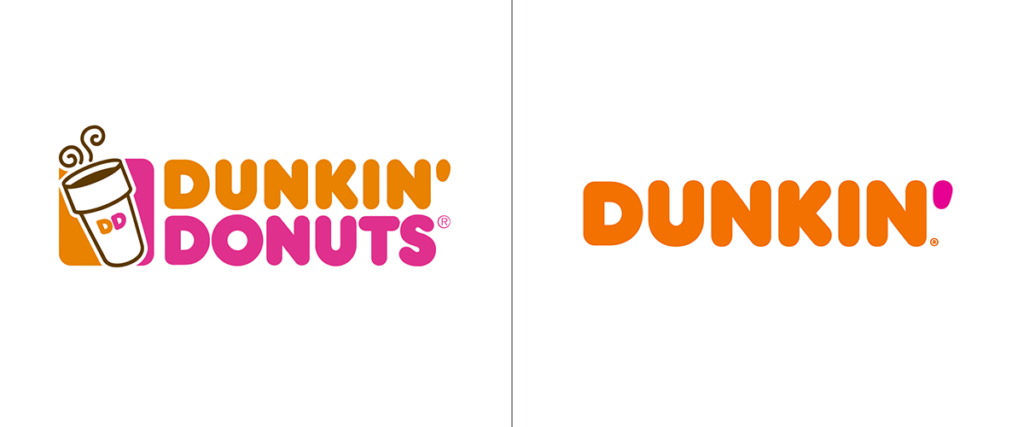
Burger King took a step back in time with their most recent logo (2021), referencing the round, bubbly, vintage-style design they used from 1969 to 1994.
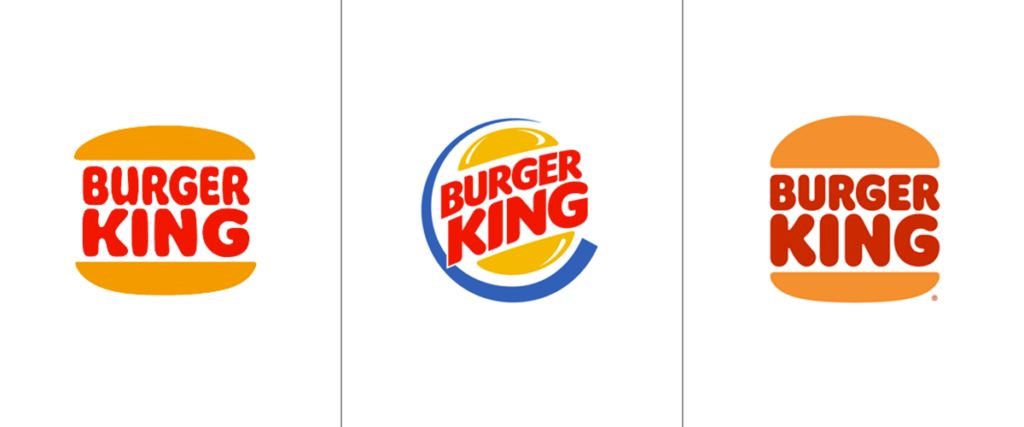
Use this Rebranding Checklist to Plan Your Strategy
The final step in the process is to establish a rebranding launch strategy. Executing your plan with precision and attention to detail is what will set your new identity apart from your competition. That’s where having a reliable, proven rebranding checklist comes in!
To ensure your rebrand goes smoothly, it’s crucial to:
- Set a timeline.
- Identify branded pieces that will need to be updated.
- Assign responsibilities to everyone involved in the project.
We’ve laid out all the steps your company should take in our series of rebranding checklists below.
Logistical & Legal Rebranding Checklist
The logistical aspect of the process can be so intimidating that companies put off rebranding, for years. Or, some companies get befuddled and stall while deciding what should be in their rebranding checklist. Fear not, with proper planning, you can space items out over time to make them less overwhelming.
- Consider timing. Your accountant will thank you for planning around tax season.
- Hire a lawyer to assist and catch any loose ends with business permits and trademarks for your local and state jurisdictions. (Every rebranding checklist should consider this point.)
- Decide if you should be outsourcing to a marketing agency that can handle the logistics and provide a new perspective from outside your business.
- Apply to trademark your new brand name, taglines, and/or new product names.
- Obtain new URLs.
Visual Rebranding Checklist
Taking into account every graphical detail is what will make your new brand resonate with your target audience. With our visual rebranding checklist, you can develop a personalized and comprehensive plan for making every necessary update.
- Establish a clear review and approval process for new branded pieces. It’s imperative to understand how they will be reviewed and who has the final say. Ensure this is in your rebranding checklist and you’ll avoid introducing confusion.
- Get second and third opinions. If the rebrand is occurring internally, take the time to gather opinions from your audience. Your new brand needs to resonate with them, not you.
- Create a new style guide for internal review that includes usage guidelines for the logo, fonts, and colors. Once you’ve established your updated style guide, this will be your guiding light.
- Create a list of every item that needs to be redesigned. Start with urgent items and pieces that truly define the brand. Then, knock out smaller items like stationery.
- Send out a new style guide and asset kit externally to relevant partners who need access to your logo and identity.
Internal
This is normally the last step of a rebrand, because you have the flexibility to make internal updates at a less accelerated pace. However, it’s still important to catch and remove every instance of your previous branding.
Schedule an all-hands meeting to share the new brand and its messaging internally, and pick a date for the following items to be updated:
- Bills, checks, and other printed materials.
- Phone systems, voicemail messages, and email footers.
- Server and file names.
- Computer logins.
- Interior design and outdoor signage.
Think a rebrand is right for you? From guiding your staff through the process internally to augmenting your team to gain a fresh perspective, Tower can help! Contact us today to get started.
Editor’s note: This blog was originally published on February 20, 2019. It was updated on August 1, 2023.
 By Kelly P
By Kelly P  Kimmick
Kimmick  Grace Z
Grace Z